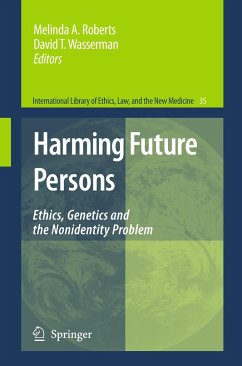This collection of essays, written by noted scholars and theorists, covers everything from the practical to the theoretical, and investigates the obligations we have to future persons, ranging from our own future offspring to distant future generations.
Melinda A. Roberts and David T. Wasserman 1 Purpose of this Collection What are our obligations with respect to persons who have not yet, and may not ever, come into existence? Few of us believe that we can wrong those whom we leave out of existence altogether-that is, merely possible persons. We may think as well that the directive to be "fruitful, and multiply, and replenish the earth" 1 does not hold up to close scrutiny. How can it be wrong to decline to bring ever more people into existence? At the same time, we think we are clearly ob- gated to treat future persons-persons who don't yet but will exist-in accordance with certain stringent standards. Bringing a person into an existence that is truly awful-not worth having-can be wrong, and so can bringing a person into an existence that is worth having when we had the alternative of bringing that same person into an existence that is substantially better. We may think as well that our obligations with respect to future persons are triggered well before the point at which those persons commence their existence. We think it would be wrong, for example, to choose today to turn the Earth of the future into a miserable place even if the victims of that choice do not yet exist.
Melinda A. Roberts and David T. Wasserman 1 Purpose of this Collection What are our obligations with respect to persons who have not yet, and may not ever, come into existence? Few of us believe that we can wrong those whom we leave out of existence altogether-that is, merely possible persons. We may think as well that the directive to be "fruitful, and multiply, and replenish the earth" 1 does not hold up to close scrutiny. How can it be wrong to decline to bring ever more people into existence? At the same time, we think we are clearly ob- gated to treat future persons-persons who don't yet but will exist-in accordance with certain stringent standards. Bringing a person into an existence that is truly awful-not worth having-can be wrong, and so can bringing a person into an existence that is worth having when we had the alternative of bringing that same person into an existence that is substantially better. We may think as well that our obligations with respect to future persons are triggered well before the point at which those persons commence their existence. We think it would be wrong, for example, to choose today to turn the Earth of the future into a miserable place even if the victims of that choice do not yet exist.
From the reviews:
"This volume is intentionally and wholeheartedly a philosophical book dealing with conceptual analysis (a lot of papers address aspects of 'harm'), the analysis of ethical judgments, meta-ethical questions (the tension between deontology and consequentialism) and the ontology (or semantics) of future and non-existing persons. ... this book is highly recommended for everyone interested in the impact of our actions on future people-not for philosophers only." (Michael Quante, Medicine Health Care & Philosophy, Issue 4, 2010)
"This volume is intentionally and wholeheartedly a philosophical book dealing with conceptual analysis (a lot of papers address aspects of 'harm'), the analysis of ethical judgments, meta-ethical questions (the tension between deontology and consequentialism) and the ontology (or semantics) of future and non-existing persons. ... this book is highly recommended for everyone interested in the impact of our actions on future people-not for philosophers only." (Michael Quante, Medicine Health Care & Philosophy, Issue 4, 2010)








